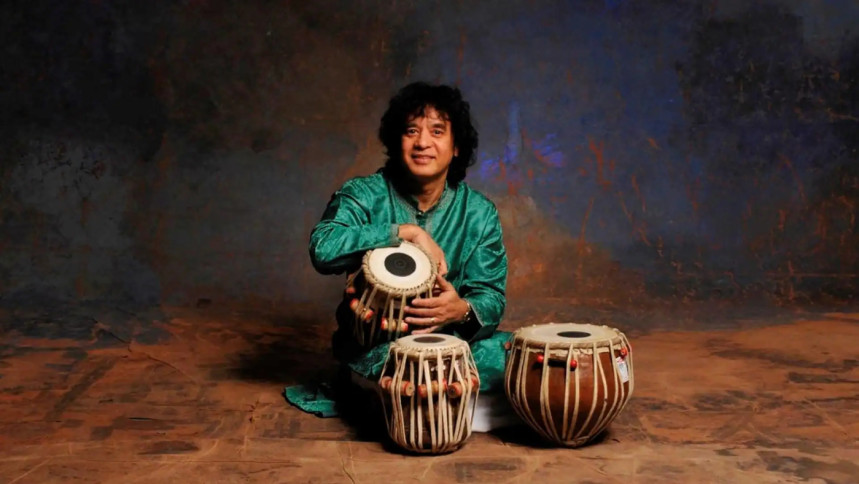The enduring legacy of Ustad Zakir Hussain
Legendary classical music maestro Ustad Zakir Hussain, a towering figure in Indian classical music, has passed away at the age of 73. The world has lost a genius, a man whose rhythmic magic transcended borders, cultures, and genres, uniting audiences globally.
As the eldest son of another tabla legend, Ustad Alla Rakha, Zakir Hussain carried forward a legacy that made him a bridge between traditional Indian classical music and the modern global stage.

In a career that spanned over six decades, Zakir Hussain worked with not just India’s musical stalwarts like Pandit Ravi Shankar and Ustad Ali Akbar Khan but also legends like George Harrison and Van Morrison. His presence at George Harrison’s historic “Concert for Bangladesh” in 1971, alongside his father Ustad Alla Rakha, was a pivotal moment.
“It was an impossible feat, but it had to be done. It was crucial to get the message of Bangladesh out to the world,” he once recalled, speaking of how music became a vehicle for global solidarity.
“Through the collective power of music from artistes all around the world, something unimaginable happened. I was there, I saw it all with my own eyes. George Harrison didn’t just stop at organising the concert; he made sure each artiste donated money as well. I remember watching him hold the donation box while Bob Dylan wrote out a check and dropped it in. The compassion, love, and enthusiasm for the people of Bangladesh, for whom the concert was held, were evident in every artiste. It was an indescribable experience,” Zakir recalled his ties with Bangladesh in a past interview during one of his many visits to the country.
“I am not a torchbearer of Indian classical music,” he once said, reflecting the humility that defined him despite his monumental stature in the world of rhythm. For him, music wasn’t about claiming titles or fame. “Each instrument has a spirit that can guide you to say what they want to say. So that’s what we are discovering with tabla,” he explained. Zakir Hussain treated the tabla as more than just a percussion instrument—it was a living, breathing voice.
I still remember my first encounter with his genius. It was the brutal winter of 2015, and I, then a naive first year university student, found myself at the Bengal Classical Music Festival in Dhaka. The atmosphere was frozen, but the audience, including me, was captivated by a lineup of subcontinental classical giants. Pandit Hariprasad Chaurasia, Pandit Shivkumar Sharma, Ustad Amjad Ali Khan—these names were familiar yet distant to someone unversed in the intricacies of classical music. But the moment Ustad Zakir Hussain took the stage, the icy stillness melted. His fingers danced across the tabla with such grace and fire that the cold night felt far away. His music weaved warmth into the air, leaving the audience breathless, enchanted.

I felt a divine connection, something intangible but powerful, as if I had been drawn into the very heart of the music. The purity of his sound transcended comprehension, echoing through the night. Each beat of his tabla was both a whisper and a roar, a flicker of rain and fire. It was the kind of magic people often associate with the mythical Tansen — the ability to summon the elements through sound.
When it came to living up to his father’s legacy, Zakir was disarmingly honest. “I never wanted to fit in Abbaji’s shoes and am happy to walk in my own,” he often remarked, appreciating the immense gift of music passed down to him while insisting on carving out his own path.
Hussain’s humility was perhaps his most endearing trait. Zakir never allowed his fame to overshadow his music. “Don’t worry about being a great master or guru, just try to be a great student. As long as you are a great student, the well of knowledge will not dry up,” he would say, always reminding those around him of the importance of continuous learning.
Hussain often shared a personal childhood memory, one that perfectly encapsulated his bond with his father and music. “The tradition is the father is supposed to recite a prayer in the baby’s ear, welcoming the baby. My father didn’t give Aazan but started playing tabla near my ear. Everybody wondered what my father was doing? He said that my Aazan was only this. I am a devotee of Saraswati and therefore this is my prayer.” That image of the tabla replacing a prayer stuck with him—and perhaps, it defined how deeply spiritual and rooted his connection to the instrument was.

Despite his global fame, Zakir Hussain’s presence was serene, always smiling, always grateful for the opportunity to perform. “Music is an infinite ocean and I am just a humble sailor,” he would say, shrugging off the endless accolades that came his way. He was, after all, not just a musician but a statesman of rhythm, one who respected the art of accompaniment and believed in elevating his fellow musicians rather than seeking the spotlight for himself. “The tabla is not just an instrument; it is my mate, my brother, my friend, and my spirit,” the maestro once said.

His influence went beyond the stage. He composed for films, including Ismail Merchant’s “Heat and Dust” and the Cannes-acclaimed Malayalam film “Vanaprastham”, in which he also acted. His multifaceted talent extended to every corner of the musical world, from composing to performing, and even to acting—an embodiment of artistic fluidity.
Today, as we bid farewell to this maestro, we remember not just the artist but the person—a man whose every beat resonated with humanity’s most profound emotions.
LondonGBDESK//



Comments are closed.